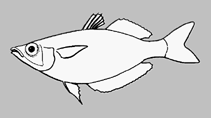Melanotaenia wanoma Kadarusman, Segura & Pouyaud, 2012
Google imageNo image available for this species;
drawing shows typical species in Melanotaeniidae.
Classification / Names Common names | Synonyms | Catalog of Fishes(genus, species) | ITIS | CoL | WoRMS | Cloffa
Etymology: Melanotaenia: Greek, melan, -anos = black + latin, taenia = stripe (Ref. 45335); wanoma: Named in reference to Wanoma village located some 16 km to the north in Arguni Bay.
Environment: milieu / climate zone / depth range / distribution range Ecology
Distribution Territories | FAO areas | Ecosystems | Occurrences | Point map | Introductions | Faunafri
Size / Weight / Age
Short description Identification keys | Morphology | Morphometrics
Body shape (shape guide): fusiform / normal.
Life cycle and mating behavior Maturity | Reproduction | Spawning | Eggs | Fecundity | Larvae
Main reference
Upload your references | References | Coordinator | Collaborators
IUCN Red List Status (Ref. 130435: Version 2025-2)
CITES
Threat to humans
Human uses
More information
Food items (preys)
Diet composition
Food consumption
Food rations
Predators
Ecology
Growth parameters
Max. ages / sizes
Length-weight rel.
Length-length rel.
Length-frequencies
Mass conversion
Recruitment
Abundance
Reproduction
Maturity
Maturity/Gills rel.
Fecundity
Spawning
Spawning aggregations
Eggs
Egg development
Larvae
Larval dynamics
Gill area
Brain
Otolith
Body composition
Nutrients
Oxygen consumption
Swimming type
Swimming speed
Visual pigments
Fish sound
Diseases & Parasites
Toxicity (LC50s)
Genome
Genetics
Heterozygosity
Heritability
Genetic Diversity
Aquaculture systems
Aquaculture profiles
Strains
Ciguatera cases
Stamps, coins, misc.
Tools
Special reports
Download XML



